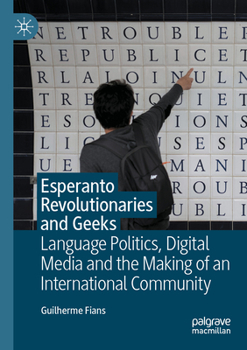Esperanto Revolutionaries and Geeks: Language Politics, Digital Media and the Making of an International Community
Select Format
Select Condition 
Book Overview
This book explores how Esperanto - often regarded as a future-oriented utopian project that ended up confined to the past - persists in the present. Constructed in the late nineteenth century to promote global linguistic understanding, this language was historically linked to anarchism, communism and pacifism. Yet, what political relevance does Esperanto retain in the present? What impacts have emerging communication technologies had on the dynamics...
Format:Paperback
Language:English
ISBN:3030842320
ISBN13:9783030842321
Release Date:January 2023
Publisher:Palgrave MacMillan
Length:267 Pages
Weight:0.77 lbs.
Dimensions:0.6" x 5.8" x 8.3"
Customer Reviews
0 rating





